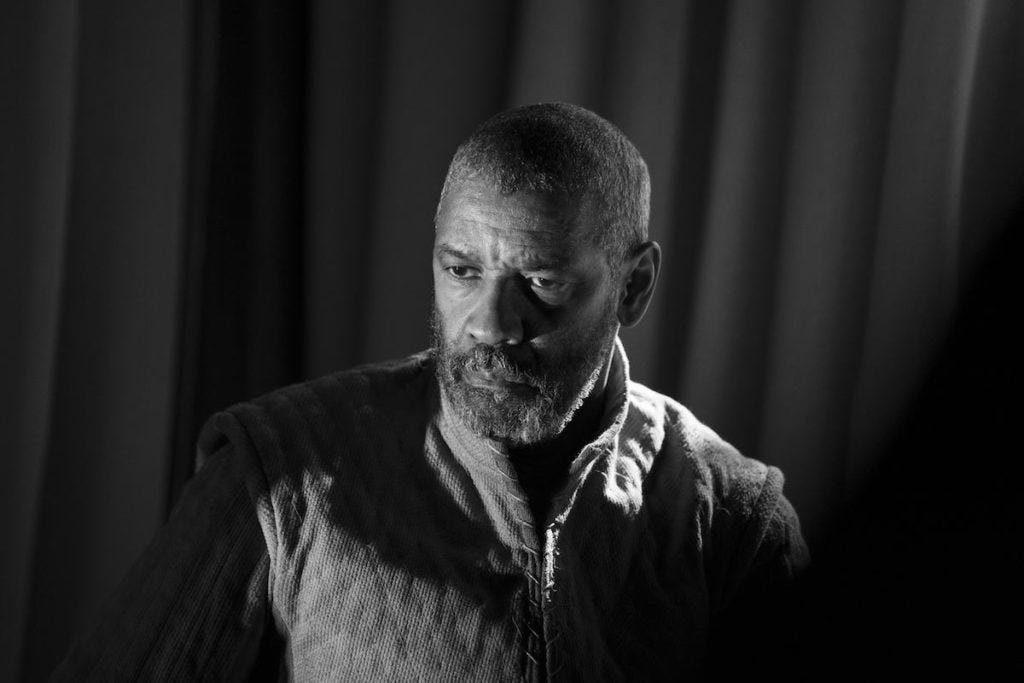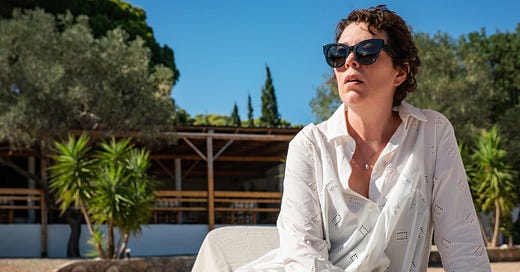‘The Lost Daughter’ and ‘Macbeth’ Reviews
Two recent streaming options on two different parenting dilemmas.
The Lost Daughter, now on Netflix, has struck a chord with critics and audiences enduring the pandemic. It’s easy to see why when, after a few scenes at the beach resort where we spend most of the film, we flash back to earlier in the life of Leda (Olivia Colman in the present on the beach; Jessie Buckley in the past with her young children and husband) as she struggles to balance raising her two girls with her efforts to finish her doctorate.
There’s Leda, listening to Italian and working on translations, as the two girls are crying for help in the other room. Her husband, Joe (Jack Farthing), is on the phone, and he begs her to stop working for a moment to see what’s the matter with them. She tries to ignore him and the girls and stubbornly listen on but eventually the racket grows too great and she stops and she goes to them and looks at what’s the matter. One of the girls has a booboo. Leda refuses to kiss it and make it better, the look of hopelessness on Buckley’s face dipping into something like revulsion. At her little girl? At herself?
Anyone who has grappled with juggling their professional responsibilities and their responsibilities to their children as we endure endless COVID-inspired lockdowns and closures and quarantines of schools and daycares will empathize with that look. We’ve all felt it at one point or another. Leda is us. Thankfully, most of us have handled it better than she did.
We spend more of the film with the older Leda, where she is vacationing in Greece alone; her daughters are distant and closed off when she connects with them on the phone. Through the flashbacks we come to understand why, but we get hints early on via Leda’s interactions with a rowdy family of Americans. They are positioned as the villains, interrupting the peace of the beachside with their boisterousness; when Leda refuses to move down the beach a bit to a different umbrella so they can all sit together, we believe her to be valiantly standing her ground.
But that stubbornness takes on a different color a bit later, when Leda steals a doll from a little girl related to those un-quiet Americans. The child is distraught; we see her crying for days. And yet Leda holds on to it—the behavior of a sociopath, the response of someone with a complete inability to feel anything for anyone else, an inability to recognize or care about pain your actions cause someone else. Yet Leda also cleans the doll, sleeps with it, loves it. This strange bit of antisocial behavior helps us understand the actions she takes in the flashbacks.
The character Leda calls to mind is The Wolf of Wall Street’s Jordan Belfort, another individual who abandoned a family to pursue something, and someone, they wanted. And writer/director Maggie Gyllenhaal, like Martin Scorsese before her, is very circumspect in what she shows: she condemns simply with what she displays, refusing to lead us by the hand and spell it all out.
But the key image comes early on, when Gyllenhaal serves up a shot of a bowl of fruit in Leda’s seaside apartment. On the surface, everything looks nice—delicious, even. But when Leda picks up a piece there is rot underneath, maggots rolling about. It is a simple-but-perfect visual illustration of the life Leda has chosen for herself and the rot at the heart of her soul.

If The Lost Daughter is about an inability to balance one’s goals with one’s children, The Tragedy of Macbeth is, at least in part, about what happens when one is confronted with a lack of children, period.*
Joel Coen directs Denzel Washington as the titular king of Scots, and there’s something to be said for a slightly older, slightly doughier, slightly sadder Macbeth as portrayed by Washington. Here is a man who, despite his many successes, finds himself passed over in favor of the king’s son. Not surprising, perhaps; such is the way of the world. But galling still, given his and Lady Macbeth’s (Frances McDormand) own failure to produce a line of heirs. And doubly galling, perhaps, given that the three weird sisters (Kathryn Hunter) suggest Macbeth may take the crown but it will be his friend and ally Banquo (Bertie Carvel) to sire a long and fruitful line of kings.
Macbeth, of course, avenges this slight by taking the crown via duplicitous regicide. But the crown is no comfort to the childless king, who sits unhappily on the throne, dispensing insults. “What soldiers, whey-face?” he asks of a trembling minion. When told of their origin, he dismisses them with a gesture and a grimace and a cry—“Take thy face hence!”—that would bring a smile to the face of Det. Alonzo Harris, the role for which Washington won his second Oscar. Should he receive his third for Macbeth, few will voice complaint.
The Tragedy of Macbeth, now streaming on Apple TV+, is, of course, based on a play, and all films based on plays run the risk of coming across as little more than a filmed play. (Washington’s own Fences from a few years back runs afoul of this.) Joel Coen solves this problem by essentially merging the look of a set on a stage with the methods and montage of filmmaking: Every set looks like something you might see on a stage, all exaggerated arches and foggy emptiness, but each set is unique and separate. Sharp angles and stark lighting choices dominate. The effect, as others have noted, calls to mind the world of German expressionism, films like The Cabinet of Dr. Caligari.
The set design and lighting choices are almost as interesting as the acting choices, and there is no shortage of great actors. In addition to Washington and McDormand, we have Brendan Gleeson, Stephen Root, Harry Melling, and Corey Hawkins, a highlight of this year’s In the Heights. But special praise should be reserved for Kathryn Hunter, whose turn as the Three Weird Sisters is haunting and strangely physical. She brings a contortionist’s sensibility to the performance, a crow made flesh.
To call The Tragedy of Macbeth “fun” feels wrong, but it is, undoubtedly, imbued with a darkly comic sensibility, as one might expect from a Coen Brother film. I certainly laughed out loud a couple of times. I imagine you will too.
*I tweaked this line so as not to imply infertility, which was not my intent.





